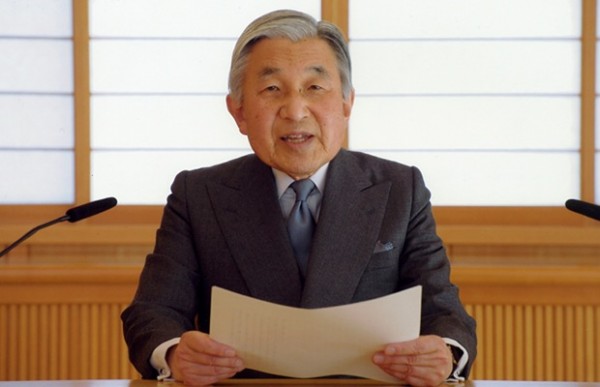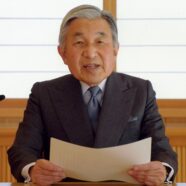On the Spectacle of Disaster, Part II: Disaster of a Different Sort

As I compose these remarks, the latest news from Japan is that over 6,000 people are now officially confirmed dead with over 10,000 others still missing – most of them presumed dead, as well. More ominous still is the specter of nuclear holocaust, with a full-scale meltdown happening, or about to happen, or having happened already, depending on whom you ask and who answers, at the Daiichi nuclear plant, 150 miles north of Tokyo.
Radiation released by damaged reactors at the Daiichi plant has been detected in the United States, but it has not reached and, we have been assured, will not reach, dangerous levels. But how, in that case, to explain the uncannily incandescent madness that seems to have taken hold of some among us in the wake of the tragedy? Consider the case of rapper 50 Cent as one example. On the morning of the earthquake and tsunami, he took to Twitter to quip: “Look this is very serious people I had to evacuate all my hoe’s from LA, Hawaii and Japan. I had to do it. Lol.” Shortly thereafter, as though realizing the genuine gravity of the situation, he backtracked from those glib comments, tweeting: “Nah, this is nuts but what can anyone do about it. Let’s pray for anyone who has lost someone.” But moments later, as though seized by an almost pathological indecisiveness, the rapper retracted his retraction, writing: “Some of my tweets are ignorant I do it for shock value. Hate it or love it. I’m cool either way.” Not long after, and also by way of Twitter, came a series of half-baked one-liners from comedian Gilbert Gottfried, including the somewhat illiterate “I just split up with my girlfriend, but like the Japanese say, ‘They’ll [sic] be another one floating by any minute now,’” and the vaguely gross “I asked a girl in Japan to have sex with me. She said ‘okay, but you’ll have to sleep in the wet spot.” More than just a mediocre comedian, the tweets suggested a man who had clearly lost his bearings. See, if you think it had been a long time since you’d last heard from Gilbert Gottfried, you’re actually probably wrong. Gottfried is pretty washed-up as a comedian and celebrity but he has, in recent years, managed to make quite a nice living as the voice of the duck featured in commercials for the multinational disability insurance company Aflac, a duck whose main function is to abrasively quack the name of the company. As it turns out, that company, which made both its name and its fortune selling cancer policies to Japan in the 1970s, continues to take some three-quarters of its revenue from the country. Needless to say, Gottfried – despite a hasty public apology – has been fired and his now former employer, turning turmoil into publicity, has begun a nationwide talent search for a new voice of the Aflac Duck. One person sure not to be considered for that job is the now former UCLA co-ed Alexandra Wallace, who last week posted a three-minute rant on YouTube entitled “Asians in the Library.” According to the reliably salacious Huffington Post, in the video in question (it has been removed from YouTube) Wallace blasted Asian students for, among other indiscretions, “disrupting her studies at the library by calling family members in the wake of the tsunami.” Wallace’s own public apology, proffered after university officials began looking into the possibility that she had violated UCLA’s student code of conduct, consisted of the following gem of utterly failed introspection: “I cannot explain what possessed me to approach the subject as I did.”
Then, of course, comes the money, which is, it seems, the best that the rest of us have to offer. On Thursday, the actress Sandra Bullock made a well-publicized one million dollar donation to Japanese relief efforts. On Wednesday, purveyor of high-end hipster men’s clothing, Nepenthes, held a sample sale at their New York City showroom to benefit the same cause. In Santa Barbara, where I live, a group of Japanese teenagers have staked out a spot on State Street where, for days now, they have been collecting donations from passersby – and doing a lot better, from the looks of things, than the panhandlers on whose territory they have encroached. But of what use will all this money possibly be? Japan is one of the world’s wealthiest nations. It has its own doctors and scientists and technicians and, if we can take President Obama’s recent State of the Union Address at its word, they’re probably a good deal more competent than ours. The country’s enormous trade surplus has been accused of giving it an unfair advantage in the global marketplace we share. It’s hard to argue that this is a question of money, and therein, perhaps, lay the roots of a madness merely exemplified by the outright buffoonery of people like 50 Cent, Gilbert Gottfried, and Alexandra Wallace: a madness whose touch we have all, perhaps, felt in recent days, when faced with the compulsion to do or say the right thing in response to the exhaustively documented suffering in Japan. Recent events of comparable magnitude – the earthquake in Haiti, the tsunami in Thailand, and so forth – have been represented, on this side of reality, as natural disasters converted into catastrophes by the fact that their victims lacked the means (a word that should be taken in its economic sense, above all) to respond to them effectively, and so, I think, we have been able to assimilate those disasters without difficulty, to pay our respects and make our donations and then carry on, as at ease as ever in our own more comfortable lives. What we are witnessing in Japan, by contrast, is a disaster of a different sort: the disaster of our having created the potential for disasters that exceed not our means – which, on this side of reality, are effectively without limit – but rather our very capacity for response.
This past Wednesday, making a rare public appearance, Japanese Emperor Akhito delivered televised remarks in which he urged his people not to “abandon hope.” In a way, there was something eloquent in the simple bit of advice. Hope, after all, is the very stuff of which life is made – survival itself. What the Emperor failed to mention, however, is that when hope is the only thing we have left, it has surely abandoned us already.






